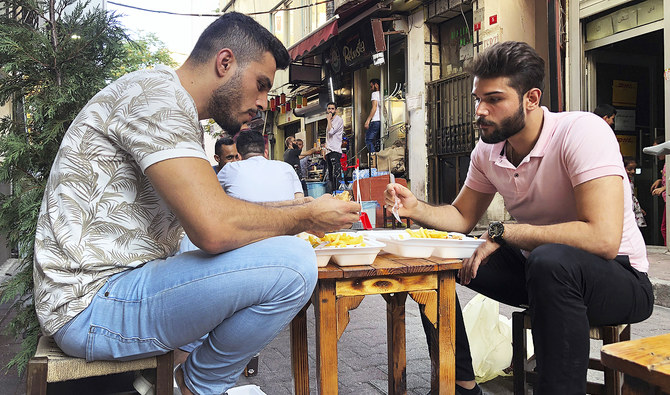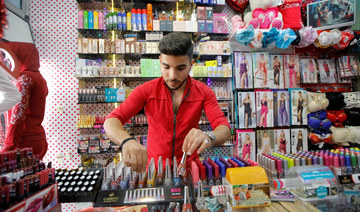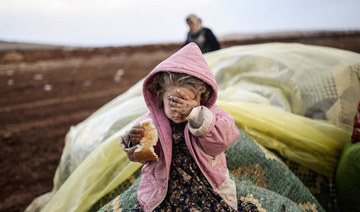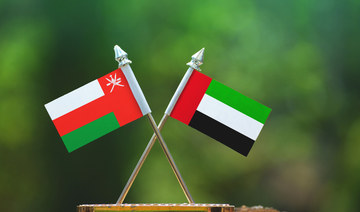BEIRUT: Mustafa, a 21-year-old Syrian in Turkey, was at the shoe factory in Istanbul where he worked making army boots when three policemen stormed in, asking if everyone had their papers. He and three other Syrian refugees did not.
Within a day, Mustafa and a busload of other refugees would be driven to Turkey’s southern border and forced to go back to their war-torn country.
“They told us things like, ‘Don’t come back to Turkey’ and ‘Go liberate your country’. Things like that,” Mustafa recalled, speaking by phone to The Associated Press from his hometown of Salqin in the opposition-held Syrian province of Idlib. He asked that his full name not be published, fearing for his safety.
Mustafa is among hundreds of Syrian refugees who have been detained and reportedly forcibly deported to Syria in the past month, according to accounts by refugees to the AP. The expulsions reflect rising anti-refugee sentiment in a country that once flung open its borders to millions of Syrians fleeing civil war.
For weeks, Turkey has been carrying out a campaign to re-inforce its rules requiring Syrian refugees to stay in cities where they are registered with the government. Accounts by Mustafa and other Syrians suggest that along with that campaign, some unregistered refugees are being forced out of the country. The AP interviewed six Syrians who said they were among large groups deported to Syria in the past month.
The Turkish government categorically denies claims of forced deportations for registered and unregistered Syrians, saying only voluntary returns are allowed. Turkey is bound by an international law that protects against return to a country where a person faces persecution.
“I am officially denying such claims, it is not possible,” said Ramazan Secilmis, an official with the Directorate General of Migration Management. He said 337,000 Syrians have voluntarily returned over the course of the war to Turkish-controlled zones in northern Syria.
But in a report late last month, Human Rights Watch accused authorities of detaining and coercing Syrians into signing “voluntary return forms” before returning them to danger. It called on authorities to protect the basic rights of all Syrians regardless of registration status.
There are no statistics on those forcibly returned. The Bab Al-Hawa crossing — one of several crossings run by Syrian opposition authorities — saw 6,160 deportees from Turkey in July, a 40 percent jump from the month before, according to an infographic on the crossing’s official Twitter page. It did not elaborate on the circumstances of the deportations.
Asked by the AP if it was aware of any forced deportations, the UN refugee agency’s Turkey spokesperson Selin Unal said in an emailed statement that it was “following up on a number of reported cases” related to unregistered Syrians. Unal said it “could not confirm that large numbers” of registered refugees had been returned to Syria.
“UNHCR’s priority is that persons in need of international protection continue to benefit from this protection,” the statement said.
Turkey opened its borders to Syrians in April 2011 and is currently home to 3.6 million who fled the civil war, now in its ninth year.
But as Turkey suffers an economic downturn and rising unemployment, calls among Turks for Syrians to go home are growing. Analysts say rising resentment against Syrians was one reason President Recep Tayyip Erdogan’s ruling party lost the race for mayor of Istanbul in June.
An opinion survey conducted by the PIAR research center last month showed that 82.3% of the respondents agreed with the statement: “All Syrians must be sent back, I don’t like the government’s policy.” The research was conducted with 2,460 people in 26 provinces.
Under Turkey’s system, Syrians register with the government and obtain “temporary protection” status, receiving an ID card known in Turkish as a “kimlik.” The ID card allows refugees to obtain permission to work. But they are required to remain in the specific province where they obtain their registration.
Istanbul, Turkey’s most populous city — which hosts the largest number of registered Syrians, nearly 548,000 — stopped accepting new registrations last year, with authorities insisting it cannot absorb any more. But many Syrians from elsewhere have flocked to the city over the years for work.
In July, Istanbul’s governor gave all Syrians not registered in Istanbul a deadline to leave the city or be forcibly removed. The deadline was initially supposed to run out on Tuesday, but Interior Minister Suleyman Soylu told Haberturk television late on Tuesday that it had been extended for two months, until Oct. 30.
However, even for weeks before the initial deadline, police have been doing frequent checks on Syrian IDs.
Mustafa, who had come to Turkey in 2017 and was not yet registered, was caught in one of those checks.
He said he had been trying in vain to obtain a “kimlik” in Istanbul. Finally, a week before his arrest, he found a lawyer who could arrange one in the nearby city of Bursa. Mustafa did the application, and the lawyer told him to come on Monday, July 22 to Bursa to obtain the ID card.
But the police raid came the preceding Friday. Mustafa and the two other unregistered Syrians in the workshop were piled into a bus that quickly filled with other Syrians. At a nearby police station, they were ordered to sign papers in Turkish, which they could not read.
Mustafa said they were then taken to a larger police station, where they were handcuffed and put on a bus with other Syrians. They were driven for 24 hours to the border province of Hatay, where they were dropped off at an informal crossing into Syria.
Now back in Idlib, Mustafa is searching for a way to support his mother and sisters. “It is very difficult and I take care of a whole family,” he said. “There is war here. Nothing else.”
Abdullah Abdulkader, a Syrian who was working at a laundry in the southern city of Gaziantep, was with two Syrian friends heading to get dinner when police asked for their IDs.
The 27-year-old said he had registered four months ago but had still not received the “kimlik.” When he told the officer he did not have it, he was slapped, handcuffed and detained in a car for seven hours. He and several other Syrians were taken by bus to the southern city of Antakya, where they spent the night at a police station without food or drink.
The next day, he was given a choice: pay a fine equivalent to $644 and spend three months in jail, or be deported. He chose deportation.
He then had to sign a number of documents in Turkish which he was told said he could not return to Turkey for the next five years. Another document which he shared with the AP had Arabic translation. It affirmed that he is voluntarily returning to Syria even after he was informed by authorities about the security situation in his country.
Abdulkader, now in the northern Syrian town of Afrin, says he never wants to go back to Turkey.
“We went there and got deported. What more humiliation can there be?” he said. “I will search for work and will find work here.”
In Istanbul, some Syrians are hiding from the intensified controls.
Yousef Abbas, a 26-year-old from Aleppo, is registered in the city of Izmir but works in Istanbul’s vast tourism sector. “I am afraid. I don’t go out. Why? Because I would get caught,” he said earlier this week.
If he goes back to Izmir, he would be separated from his wife and children, registered in Istanbul.
Didem Danis, president of Association for Migration Research in Istanbul, said that in the first years of the Syrians’ arrival, “there was quite a positive attitude toward the newcomers.”
“But this has been going down throughout the years, and in the last two years especially as the Turkish economy goes down.”
Mohammad Wael, a Syrian from Damascus who is registered in Istanbul, works in a kebab shop in the city’s “Little Syria” district. He calls the treatment of Syrians “unacceptable.”
“If you go to the pharmacy, they will point at us as ‘those are Syrians.’ If you walk in the street, they will point at us, ‘those are Syrians.’ If we enter a supermarket, they will point at us, ‘those are Syrians’,” he said.
“Syrians are like the Turks, both are human beings and both are Muslims.”
As warm welcome chills, Turkey clamps down on Syrians
As warm welcome chills, Turkey clamps down on Syrians

- Human Rights Watch accused authorities of detaining and coercing Syrians into signing “voluntary return forms” before returning them to danger
- Turkey has been carrying out a campaign to re-inforce its rules requiring Syrian refugees to stay in cities where they are registered with the government
UN says Gaza death toll still over 35,000 but not all bodies identified

- Haq said those figures were for identified bodies — 7,797 children, 4,959 women, 1,924 elderly, and 10,006 men — adding: “The Ministry of Health says that the documentation process of fully identifying details of the casualties is ongoing”
UNITED NATIONS/GENEVA: The death toll in the Gaza Strip from the Israel-Hamas war is still more than 35,000, but the enclave’s Ministry of Health has updated its breakdown of the fatalities, the United Nations said on Monday after Israel questioned a sudden change in numbers.
UN spokesperson Farhan Haq said the ministry’s figures — cited regularly by the UN its reporting on the seven-month-long conflict — now reflected a breakdown of the 24,686 deaths of “people who have been fully identified.”
“There’s about another 10,000 plus bodies who still have to be fully identified, and so then the details of those — which of those are children, which of those are women — that will be re-established once the full identification process is complete,” Haq told reporters in New York.
Israel last week questioned why the figures for the deaths of women and children has suddenly halved.
Haq said those figures were for identified bodies — 7,797 children, 4,959 women, 1,924 elderly, and 10,006 men — adding: “The Ministry of Health says that the documentation process of fully identifying details of the casualties is ongoing.”
Oren Marmorstein, spokesperson for Israel’s Ministry of Foreign Affairs, on Monday accused Palestinian militants Hamas of manipulating the numbers, saying: “They are not accurate and they do not reflect the reality on the ground.”
“The parroting of Hamas’ propaganda messages without the use of any verification process has proven time and again to be methodologically flawed and unprofessional,” he said in a social media post.
Haq said UN teams in Gaza were not able to independently verify the Gaza Ministry of Health (MoH) figures given the ongoing war and sheer number of fatalities.
“Unfortunately we have the sad experience of coordinating with the Ministry of Health on casualty figures every few years for large mass casualty incidents in Gaza, and in past times their figures have proven to be generally accurate,” Haq said.
The World Health Organization “has a long-standing cooperation with the MoH in Gaza and we can attest that MoH has good capacity in data collection/analysis and its previous reporting has been considered credible,” said WHO spokesperson Margaret Harris.
“Real numbers could be even higher,” she said.
Five Iraqi soldiers killed in Daesh attack on army post in eastern Iraq, two security sources say

- Iraq’s defense ministry issued a statement mourning the loss of Col. Khaled Nagi Wassak “along with a number of heroic fighters of the regiment as a result of their response to a terrorist attack”
BAGHDAD: An Iraqi commanding officer and four soldiers were killed and five others injured on Monday in an attack by Daesh militants on an army post in eastern Iraq, two security sources said.
The attack took place between Diyala and Salahuddin provinces, a rural area that remains a hotbed of activity for militant cells that remain active years after Iraq declared final victory over the terrorist groups in 2017.
Iraq’s defense ministry issued a statement mourning the loss of Col. Khaled Nagi Wassak “along with a number of heroic fighters of the regiment as a result of their response to a terrorist attack.”
Security forces repelled the attack but many casualties fell in the process, the statement added.
UAE president presents Indonesia’s defense minister with Order of Zayed

- Subianto receives UAE’s highest civil honor in recognition of his contribution to improved bilateral cooperation
DUBAI: UAE President Sheikh Mohammed bin Zayed Al-Nahyan on Monday presented Indonesia’s defense minister, Prabowo Subianto, with the Order of Zayed, the UAE’s highest civil honor, in recognition of his contribution to the enhancement of cooperation between the countries.
During the meeting in Abu Dhabi, Subianto conveyed greetings from Indonesia’s President Joko Widodo and expressed his desire for the continued advancement and prosperity of the UAE, the Emirates News Agency reported. Sheikh Mohammed responded with similar wishes for Indonesia.
The president and defense minister also discussed the relationship between their countries, particularly as it relates to defense and military affairs, and ways in which it might be enhanced in the interests of both countries, and reviewed regional and international issues of mutual interest.
Sheikh Mohammed said he was keen to leverage the strong strategic ties between the UAE and Indonesia to deepen cooperation so that both nations benefit from shared opportunities for development and prosperity.
Kuwaiti emir, Omani sultan meet for official talks

- Leaders discussed the longstanding relationship between their countries
KUWAIT: Kuwait’s Emir Sheikh Meshal Al-Ahmad Al-Jaber Al-Sabah hosted Oman’s Sultan Haitham bin Tareq at Bayan Palace in Kuwait City on Monday for official talks.
The leaders discussed the longstanding relationship between their countries and explored avenues for enhancing cooperation in various sectors, the Kuwait News Agency reported.
They also addressed strategies for the advancement of the Gulf Cooperation Council, matters of shared interest and various regional and international affairs.
The meeting came during the sultan’s two-day state visit to Kuwait and was followed by a banquet held in his honor.
Kuwait’s Prime Minister Sheikh Ahmad Al-Abdullah Al-Sabah and other officials from the two countries also attended the meeting.
US doesn’t believe ‘genocide’ occurring in Gaza: White House

- White House National Security Adviser Jake Sullivan insisted that the responsibility for peace lay with Hamas
- Biden has come under fire from Republicans for halting some weapons shipments
WASHINGTON DC: The United States does not believe that genocide is occurring in Gaza but Israel must do more to protect Palestinian civilians, President Joe Biden’s top national security official said Monday.
As ceasefire talks stall and Israel continued striking the southern city of Rafah, White House National Security Adviser Jake Sullivan insisted that the responsibility for peace lay with militant group Hamas.
“We believe Israel can and must do more to ensure the protection and wellbeing of innocent civilians. We do not believe what is happening in Gaza is a genocide,” Sullivan told a briefing.
The US was “using the internationally accepted term for genocide, which includes a focus on intent” to reach this assessment, Sullivan added.
Biden wanted to see Hamas defeated but realized that Palestinian civilians were in “hell,” Sullivan said.
Sullivan said he was coming to the White House podium to “take a step back” and set out the Biden administration’s position on the conflict, amid criticism from both ends of the US political spectrum.
Biden has come under fire from Republicans for halting some weapons shipments to press his demands that Israel hold off a Rafah offensive, while there have been protests at US universities against his support for Israel.
The US president believed any Rafah operation “has got to be connected to a strategic endgame that also answered the question, ‘what comes next?’” Sullivan added.
This would avoid Israel “getting mired in a counterinsurgency campaign that never ends, and ultimately saps Israel’s strength and vitality.”






















